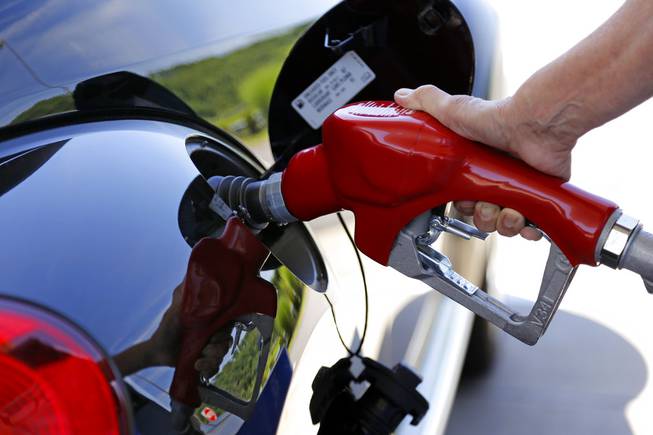
Gene J. Puskar / AP
In this Thursday, July 16, 2015, file photo, a customer refuels her car in Robinson Township, Pa. The Trump administration is rolling back tough Obama-era mileage standards and gutting one of the United States’ biggest efforts to slow climate change.
Wednesday, April 1, 2020 | 2 a.m.
View more of the Sun's opinion section
President Donald Trump’s rollbacks on fuel mileage standards for automobiles were the equivalent of easing food-safety regulations during an E. coli outbreak.
It’s awful leadership, and it’s going to hurt Americans.
In a rule announced this week and scheduled for implementation by late spring, the Trump administration is relaxing an Obama-era requirement for automakers’ fleets to average 54 miles per gallon by 2025. Under the rollback, the fleets would have to average about 40 mpg by that time.
The ramifications include 80 billion extra gallons of gasoline being burned and an additional 1 billion tons of carbon dioxide being pumped into the atmosphere, according to a draft of the rule.
One of the outcomes of these additional tailpipe emissions will be a reduction in air quality, which in turn will raise Americans’ risk of respiratory problems. Coming during a time when the country is in a desperate fight to slow the spread of coronavirus, which attacks the respiratory system, the rollback is simply appalling.
Trump’s action also will contribute to global warming and the catastrophic problems that come with it — drought, killer storms, sea level rise and much more.
And while the administration contends the rule will help the economy by allowing manufacturers to curtail their investments in developing higher-mileage vehicles, even several large automakers found it too aggressive.
“The auto industry has consistently called for year-over-year increases in fuel efficiency,” said John Bozzella, president of the Alliance for Automotive Innovation, a lobbying group that represents the world’s largest auto companies, in The New York Times. “We need a policy environment that drives improvements in fuel economy, and the infrastructure that supports a transformation to net-zero emissions.”
The Trump standards are among the weakest among car-manufacturing nations, which puts American automakers in jeopardy of losing positioning in the global market. While automakers elsewhere are moving toward building lower-emission, higher-mileage vehicles, the U.S. market is being tilted toward production of gas guzzlers.
According to media reports, the Trump administration has been rushing to complete the order so that as the nation emerges from the coronavirus outbreak, Trump could hold it up as an example of strong steps he took to get the economy moving again.
But there’s disagreement on whether it will actually help — including in Trump’s own administration. An internal economic analysis in January said that while the price of new cars and light trucks would decrease by about $1,000, consumers would spend about $1,400 more in fuel to drive them due to lower mph ratings. The total negative economic impact would be between $13 billion and $22 billion, according to the analysis.
Since those figures came out, there’s reportedly been three months of browbeating and voodoo math in the White House to make the numbers fit Trump’s narrative.
The good news is that 20 states were waiting to file lawsuits to block the implementation of the rule, meaning it will likely not go into effect anytime soon. Meanwhile, lawsuits on related issues are still in play, including one against an earlier Trump rule revoking the right of states to establish vehicle emissions standards more aggressive than the federal government’s.
The states have it right. Anyone who sees the devastating effects of climate change playing out before their eyes knows emissions standards needs to be tightened, not relaxed. And as we watch a deadly respiratory virus claim tens of thousands of lives worldwide, the need to improve air quality and help people maintain their health becomes ever more urgent.
